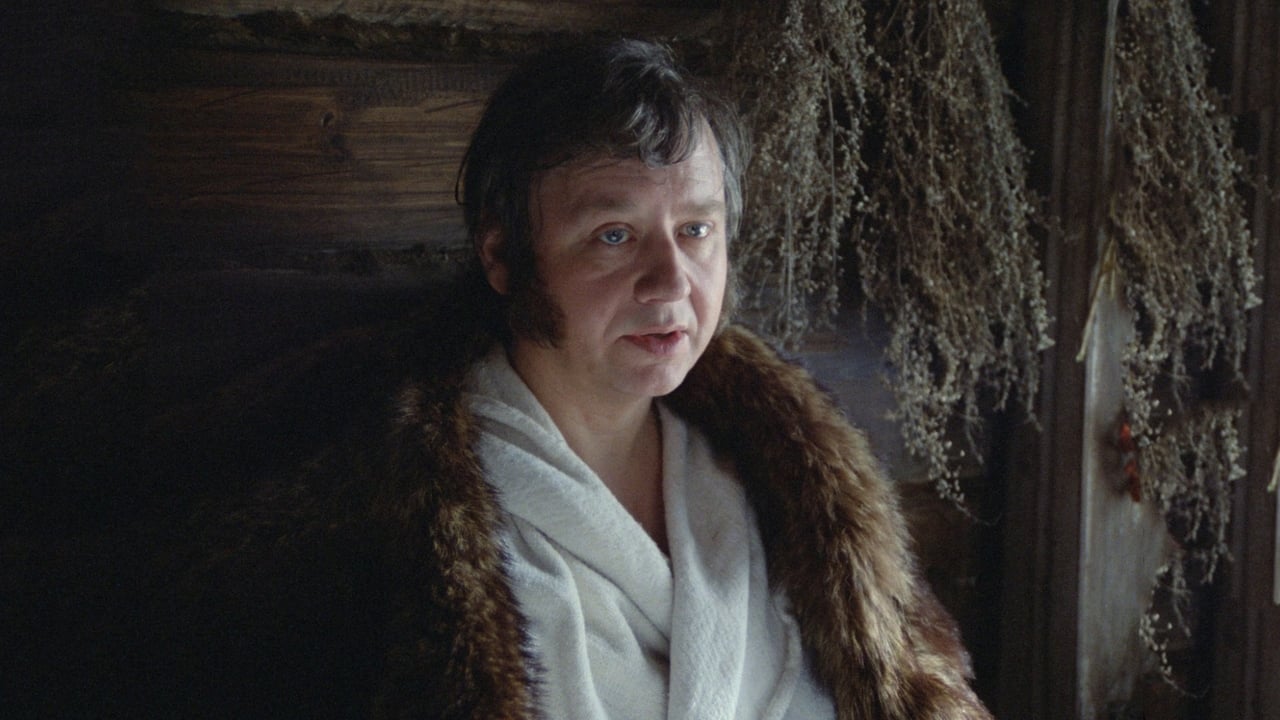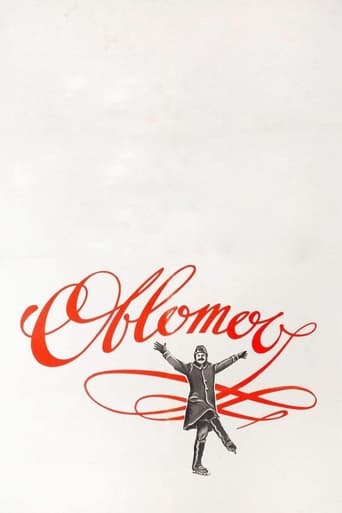TrueJoshNight
Truly Dreadful Film
Sexylocher
Masterful Movie
PiraBit
if their story seems completely bonkers, almost like a feverish work of fiction, you ain't heard nothing yet.
Sarita Rafferty
There are moments that feel comical, some horrific, and some downright inspiring but the tonal shifts hardly matter as the end results come to a film that's perfect for this time.
gavin6942
St. Petersburg, mid 19th century: the indolent, middle-aged Oblomov lives in a flat with his older servant, Zakhar. He sleeps much of the day, dreaming of his childhood on his parents' estate. His boyhood companion, Stoltz, now an energetic and successful businessman, adds Oblomov to his circle whenever he's in the city, and Oblomov's life changes when Stoltz introduces him to Olga, lovely and cultured.In the Ivan Goncharov novel, Oblomov is considered an excellent example of the "Superfluous Man" concept of 1800s Russian literature. Alienated and let down by the world around them, the "superfluous man" character is often considered an outsider at odds with society. In both the novel and the film, Oblomov demonstrates this "superfluity" as an ineffective member of Russia's much criticized aristocracy. Goncharov referred to his character's passivity as "Oblomovism," and the term has since been associated with characters who possess Oblomov's apathy and membership in Russia's upper class.I have to wonder about how pre-1900s Russian literature was interpreted post-1917. Was the way the aristocracy perceived changed? It seems almost absurd to me to make such a film in 1980, when it no longer has the political impact. Unless, of course, it is even more subversive and subtle than it first appears.
Kirpianuscus
not a surprise. the novel by Goncharov is perfect choice for Mikhalkov style. Oleg Tabakov translate on screen the entire soft and fragile universe of his character. the atmosphere, the dialogs, the profound drama - pieces of a seductive film. and little more because, like in many same adaptations, the movie is a trip in the space between lines. Oblomov has new nuances. his struggle for happiness has new points who gives to the portrait from novel special significance. not a victim, not a symbol. but the good man who has a single challenge - himself. the portrait becomes seductive. and clear in new light. Tabakov explores the limits and the isles of illusion. and Mikhalkov has the courage and art and subtle science to transform the world of XIX century in shadow of a new Idiot. Oblomov becomes more realistic. and more easy to define it in a large measure. a film from a special art of seduction.
Armand
in many occasions, an adaptation is a war against novel. modifications, lost of book spirit, innovations or only errors. in this case, the masterpiece of Goncharov is key for open the Nikita Michalkov universe. recipes - respect for text, good cast, precise performance, Slav flavor. only is at right place. the drama of poor Oblomov is reconstructed, piece by piece, level by level, with grace, respect and love. more than a film, it may be a portrait or homage. and basic victory is science to transform the story in warm drawing of feelings and expectations, sins and fall. it is not a surprise. only new demonstration of Mikhalkow subtle art. and this is, for each of his films, the sign who makes difference, who gives a kind of aura to every movie and births air of refined melancholia.
LobotomyKid
Ivan Goncharov's novel Oblomov is a classic of Russian literature and a true masterpiece. It's a sociocritical and philosophical work and it anticipates the formation of the Russian revolution by showing the apathy, phlegm and decadence of the impoverished Russian (landed)gentry at the end of 19th century. The main character Oblomov is a very lovable yet weak-willed and frail nobleman. He lives in St.Petersburg and lives off the income of his manor which is far away and run-down. For days Oblomov just stays in his bed, thinking and lamenting about all the things he should do but his lethargy prevents him from taking care of these problems. He reflects on hectic daily life and what is important, the meaning of life. His counterpart is his best friend Stolz, a German. Stolz is vibrant, fun-loving and burning for action and he tries to pull out Oblomov from his lethargy but it's a very hard task. One day Oblomov falls in love... The book was written in the tradition of new realism in Russian literature, like Tolstoi, Dostojewski or Turgenjew. The interpretation of the story varies a lot between then and nowadays and critics are still arguing what Goncharov's real intention was. Many people see the novel as a swan song on Russian class society and tsardom; and it is essentially a Fin de Siècle novel. Oblomov is like the representative of a class that has outlived itself, a dinosaur of Russian nobility. It's not a coincidence that Stolz is German, he's a symbol for the modernistic and educational ideas that came from the West at that time. I agree with this interpretation on the whole, looking at the novel in the context when it was written. The novel was published in 1858, that was only 3 years before the official abolition of serfdom trough Alexander I, the beginning of extended reforms which couldn't prevent the progression of the coming revolution as we know today. Lenin later spoke at a party convention about "Oblomovism" in reference of the overthrown system, threatening that the days of Oblomovism are over. You'll even find this term today in Russian thesaurus. The other interpretation is that today many celebrate Oblomov as an icon of refusal and idleness and point out the more philosophical aspects of the story. In the days of globalisation and people worshipping "shareholder value" and the mighty dollar, Oblomov can indeed be seen as the hero of all deniers. Many of his thoughts in the novel are universal and pose questions to us that are more up to date then ever before it seems. The movie captures the essence of the story in a great way and is free of any Soviet propaganda influence you might detect in similar films; it's very accurate to the original work and one of the best literature film versions I've ever seen. The cast is wonderful, the cinematography is top notch and fits the moods of the story perfectly, sometimes dreamy (in the great outdoor scenes), sometimes realistic. Oblomov's character comes over every bit as lovable, melancholic and pensive as he is portrayed in the book. The end is a little abrupt and an important part of the story is missing. That's a pity and the reason I give this film 8 instead of 10 points; I wonder if the director encountered some problems there or if their budget was cut short for any reason. Who knows. Check this movie out, it will be hard to find I guess but it's a great work and a refreshing change when one is only used to modern films. Of course this gem should be watched in cinema and I still hope that my local art cinema will someday organise a Nikita Mikhalkov retrospective so I get the chance to see it on the big screen.

